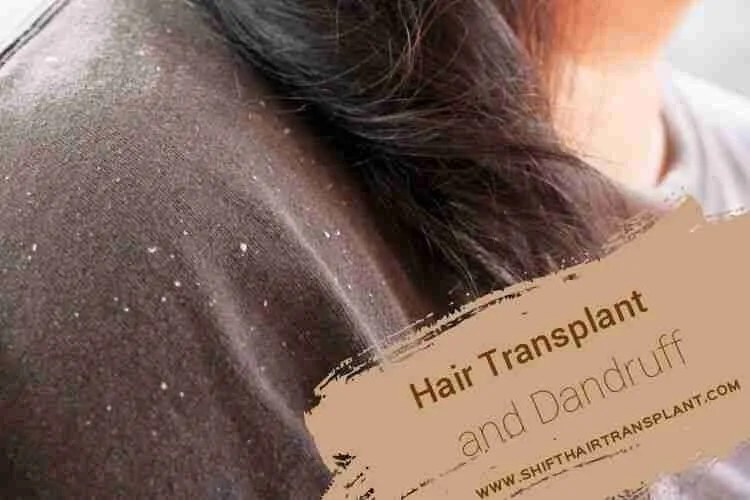
Dandruff is a common scalp problem that affects millions of people worldwide. It causes white flakes, itching, and irritation, leading many to seek effective solutions. One question that often arises is: Can a hair transplant help people with dandruff issues? In this article, we will explore the relationship between hair transplants and dandruff, providing clear and easy-to-understand information.
What is Dandruff?
Dandruff is a common scalp condition causing flakes, itching, and irritation. It results from dry skin, seborrheic dermatitis, or Malassezia fungus Mild cases can be managed with moisturizing shampoos while anti-dandruff shampoos with zinc pyrithione or ketoconazole help control severe cases Regular scalp care reduces flare-ups
Dandruff is a scalp condition that leads to flaky skin and itchiness. It is caused by various factors, including:
- Dry skin – Lack of moisture can cause the scalp to become flaky.
- Oily scalp – Excess oil can promote dandruff-causing fungus growth.
- Fungal infections – A yeast-like fungus called Malassezia is a common trigger.
- Poor hygiene – Infrequent hair washing can lead to an accumulation of dead skin cells.
- Skin conditions – Issues like eczema and psoriasis may contribute to dandruff.
How Does a Hair Transplant Work?
A hair transplant is a surgical procedure that helps people with hair loss. It involves moving hair follicles from one part of the scalp (donor area) to another (recipient area). There are two main methods:
Follicular Unit Transplantation (FUT) – A strip of hair follicles is removed and transplanted.
Follicular Unit Extraction (FUE) – Individual hair follicles are extracted and implanted in the bald areas.
Can a Hair Transplant Help with Dandruff?
1. Improved Scalp Care After Surgery
After a hair transplant, doctors provide detailed instructions for scalp care. Patients are advised to keep their scalp clean, use medicated shampoos, and avoid harsh chemicals. This improved hygiene can help manage dandruff more effectively.
2. Better Blood Circulation
Hair transplants may improve blood circulation in the scalp, promoting healthier skin. A well-nourished scalp can reduce flaking and dryness, leading to fewer dandruff symptoms.
3. Reduction in Excess Oil Production
Some people experience reduced oiliness after a hair transplant. Since excess oil can contribute to dandruff, this change may help keep flakes under control.
4. Use of Medicated Shampoos
Many people undergoing hair transplants use anti-dandruff shampoos to prevent infections and promote healing. These shampoos often contain ingredients like ketoconazole, zinc pyrithione, or salicylic acid, which help control dandruff.
Can Dandruff Affect Hair Transplant Success?
1. Pre-Surgery Effects
Severe dandruff can lead to scalp irritation and inflammation. A healthy scalp is crucial for a successful hair transplant, so patients may need to treat dandruff before undergoing the procedure.
2. Post-Surgery Complications
After a hair transplant, a flaky scalp can slow healing and increase the risk of infections. Scratching the scalp can also damage newly transplanted follicles.
How to Manage Dandruff Before and After a Hair Transplant
Before Surgery
Use a medicated anti-dandruff shampoo recommended by a dermatologist.
Avoid using harsh hair products that can irritate the skin.
Consult a doctor to treat any underlying scalp conditions.
After Surgery
Follow post-operative scalp care instructions carefully.
Avoid scratching or rubbing the scalp to prevent damage.
Use mild or prescribed shampoos to keep the scalp clean.
Stay hydrated and eat a balanced diet to support scalp health.
Alternative Treatments for Dandruff
1. Medicated Shampoos
Look for shampoos with:
Ketoconazole – Helps fight fungal infections.
Zinc pyrithione – Reduces yeast growth on the scalp.
Salicylic acid – Removes dead skin flakes.
Coal tar – Slows down skin cell turnover.
2. Natural Remedies
Aloe vera – Soothes the scalp and reduces irritation.
Tea tree oil – Has antifungal properties to fight dandruff.
Coconut oil – Helps moisturize a dry scalp.
3. Lifestyle Changes
Maintain a healthy diet rich in vitamins and minerals.
Reduce stress, as it can trigger dandruff.
Wash hair regularly to prevent buildup.
Conclusion
A hair transplant is an excellent solution for hair loss, but it is not a cure for dandruff. However, following good scalp care practices before and after the procedure can help manage dandruff effectively. If you have persistent dandruff issues, consult a dermatologist before undergoing a hair transplant. By taking the right steps, you can enjoy healthy hair and a flake-free scalp!
By keeping your scalp clean, using the right products, and following professional advice, you can manage dandruff effectively—even after a hair transplant.
